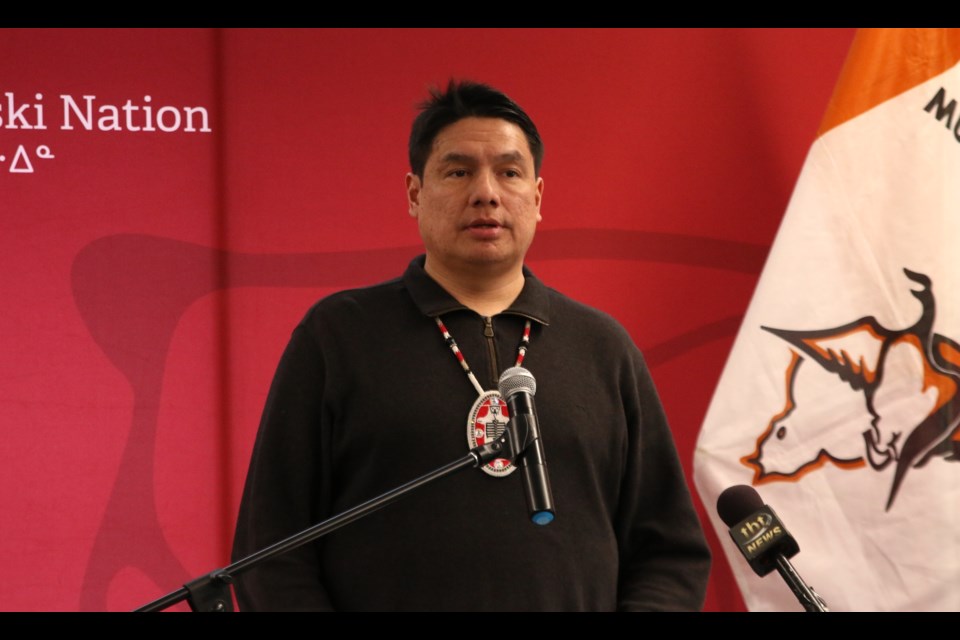THUNDER BAY — As Prime Minister Justin Trudeau meets with provincial and territorial premiers to discuss funding in an effort to address the ongoing health care crisis, First Nation leaders say they should be at the table, too, as their communities have faced a similar crisis for years.
“We should be there. NAN should be there. Mushkegowuk should be there. First Nations should be there,” said Nishnawbe Aski Nation Grand Chief Derek Fox. “The prime minister is meeting with premiers about transforming the health care system across the country and it will affect future negotiations and funding.”
Fox spoke from Thunder Bay on Tuesday at the same time as Grand Chief Alison Linklater and the Mushkegowuk Council of Chiefs did at a media conference in Ottawa where the meeting between the prime minister and premiers is taking place.
The meeting is being held to discuss federal health care funding to the provinces and territories in the wake of doctor and nurse shortages, overburdened emergency departments, and overcapacity in hospitals.
Linklater and the Mushkegowuk Council of Chiefs were rallying in Ottawa to defend treaty rights to equitable health care.
“We are here today in a show of support for Grand Chief Alison Linklater,” Fox said. “We are also here to support the Mushkegowuk Chiefs who are currently in Ottawa at a press conference calling on the governments of Canada and Ontario to include Mushkegowuk in the budget discussions for health care.”
Fox said NAN communities are in crisis and continue to face challenges including access to health care, mental health services, high suicide rates, a lack of housing and infrastructure, and a lack of clean drinking water.
These challenges make it difficult for communities to move forward on other priorities, Fox added, which include food security, environmental protections, and job creation.
“For our community members, it takes various and multiple steps and sometimes four or five people just to see an emergency room doctor. It can take days to get emergency room treatment,” Fox said. “Our community members need rapid access to services closer to home. Simple appointments can take a matter of months.”
A lack of rapid access to health care can mean a later diagnosis for serious health conditions for community members, longer treatment times, and poorer outcomes.
According to Fox, issues being experienced in Southern Ontario now, such as shortages of doctors and nurses and closure of health care centres, have been a common occurrence in NAN communities for many years.
“Building health centres and having more doctors and nurses in communities is and will be a big part of the solution. We need more infrastructure and we need to consider health care needs of our communities,” Fox said.
“It is not an understatement to say this is a matter of life and death.”
Fox pointed to collaborative steps taken during the COVID-19 pandemic by the federal and provincial government as the kind of achievements that can be made when the two levels of government come together to work with First Nation communities.
“There was pandemic capacity in our communities where none had existed before,” he said. “There is no doubt that through a tri-lateral process this can work. This can save lives. It did save lives.”
In 2016, NAN signed a Charter of Relationship Principals relating to health care with the federal and provincial government but Fox said both levels of government are now moving forward without input from First Nation communities on health care transformation.
“Right now, the prime minster is meeting with the premiers behind closed doors to discuss funding for health care delivery across the country. The premiers are requesting long-term permanent funding, which is something NAN requires to do the work under health transformation,” Fox said. “We have demonstrated that when we work together we can come up with real solutions to real problems.”
Alvin Fiddler, the former NAN Grand Chief and current NAN health transformation lead, said leaving First Nation leaders out of the discussions continues to speak to how Indigenous people are treated differently when it comes to health care in Canada.
“We are here to remind the government partners of the agreement they signed with NAN in 2017. In order for all of us to fix the system in our communities, we need to be there and we need to be active partners,” Fiddler said.
“I commend the leadership who are rising up today. Even our national Chief is not being allowed in. That shouldn’t happen. If the prime minister is serious about reconciliation, it doesn’t show. His actions speak otherwise.”
